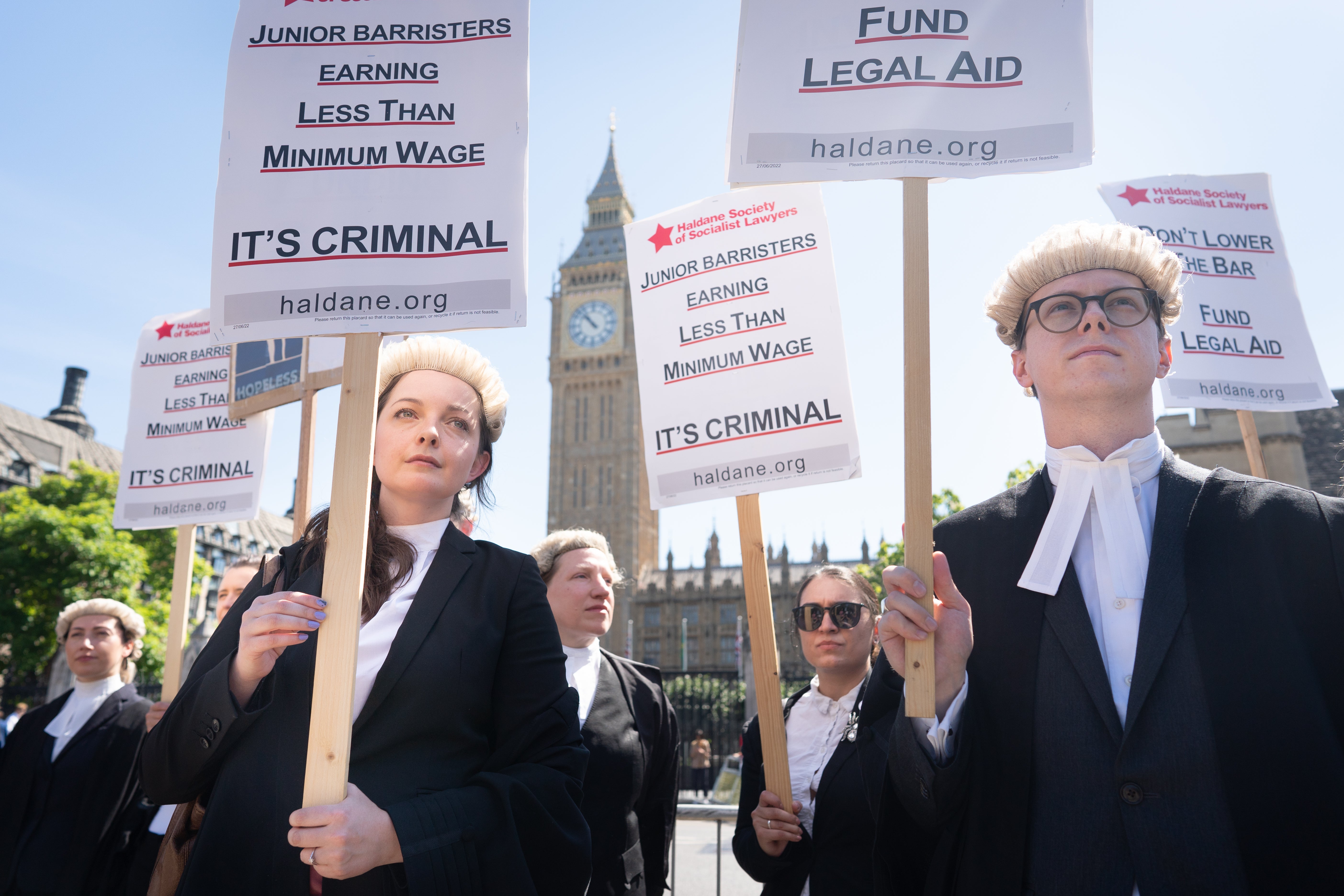Government under fire for doing ‘nothing’ to resolve industrial disputes
Criminal barristers in England and Wales voted in favour of an all-out strike.

Your support helps us to tell the story
From reproductive rights to climate change to Big Tech, The Independent is on the ground when the story is developing. Whether it's investigating the financials of Elon Musk's pro-Trump PAC or producing our latest documentary, 'The A Word', which shines a light on the American women fighting for reproductive rights, we know how important it is to parse out the facts from the messaging.
At such a critical moment in US history, we need reporters on the ground. Your donation allows us to keep sending journalists to speak to both sides of the story.
The Independent is trusted by Americans across the entire political spectrum. And unlike many other quality news outlets, we choose not to lock Americans out of our reporting and analysis with paywalls. We believe quality journalism should be available to everyone, paid for by those who can afford it.
Your support makes all the difference.The Government has been accused of doing “absolutely nothing” to resolve industrial disputes as it emerged the Justice Secretary was on holiday while criminal barristers voted for an all-out strike.
Members of the Criminal Bar Association (CBA) have been walking out on alternate weeks in a row over jobs and pay but were balloted on whether to escalate the action with an indefinite, uninterrupted strike that would start in England and Wales on September 5.
The continuous strike effectively begins next week because the action is ongoing. Friday will be the last working day for barristers before they walk out again on Tuesday August 30.
Labour leader Sir Keir Starmer said the Government was doing “absolutely nothing” to resolve industrial disputes, including the row with criminal barristers.
Justice Secretary Dominic Raab – who is on leave until Thursday with his family in Surrey – has not met the CBA since members embarked on industrial action in April, but junior ministers have met the group regularly.
A spokeswoman said Mr Raab is in regular contact with Ministry of Justice (MoJ) officials and would be back in the office later this week.
I want to see the Government step in and actually help resolve these issues
The former foreign secretary came under fire in August last year for being on holiday in Crete during the Taliban takeover of Afghanistan’s capital Kabul.
Mr Starmer, the former director of public prosecutions, told reporters in Walthamstow, east London, on Monday: “I quite understand, whether it’s barristers or others, why people and how people are struggling to make ends meet,” adding: “I want to see the Government step in and actually help resolve these issues; instead of that we’ve got a Government doing absolutely nothing.”
Pressed on whether Labour MPs would be allowed to join picket lines, he told the PA news agency: “My focus of attack is on the Government for not doing anything to resolve these issues.”
Richard Burgon, the Labour MP for East Leeds, said on Twitter: “As shadow justice secretary, I saw how Government cuts to legal aid have undermined our justice system – with many barristers’ hourly earnings being below the minimum wage. This can’t go on. Solidarity with the barristers!”
But the Conservative Party hit back at Sir Keir’s criticism, saying he “explicitly backed” the Government’s investment in legal aid and “didn’t suggest a single alternative or additional proposal”.
A spokeswoman added: “Now he’s backing this irresponsible action, which will reverse the progress we’ve made in bringing the backlog down and block victims’ path to justice.”
The CBA said 2,273 barristers cast a vote in the ballot which closed on Sunday, exceeding numbers taking part in polls in March (1,908) and June (2,055).
In the latest ballot, almost 80% (1,808) voted in favour of escalating the action while 11% (258) wanted to continue current action and 9% (207) called for an end to strikes.
According to MoJ figures, more than 6,000 court hearings have been disrupted a result of the dispute over conditions and Government-set fees for legal aid advocacy work.
Victims’ Commissioner Dame Vera Baird said the strike was the “latest symptom” of a “severely and recklessly underfunded” criminal justice system and warned victims were “ultimately paying the price”.
CBA vice chairwoman Kirsty Brimelow QC described the move as “last-resort action” over a demand for less money than it costs the Government for the courts to sit empty.
Criminal barristers are due to receive a 15% fee rise from the end of September, meaning they will earn £7,000 more per year.
But there has been anger that the proposed pay rise will not be made effective immediately and will only apply to new cases, not those already sitting in the backlog waiting to be dealt with by courts.
Justice Minister Sarah Dines said: “This is an irresponsible decision that will only see more victims face further delays and distress.
“The escalation of strike action is wholly unjustified considering we are increasing criminal barristers’ fees by 15%, which will see the typical barrister earn around £7,000 more a year.”
Downing Street said it was a “disappointing decision” that would “force victims to wait longer for justice” and urged the CBA to rethink its plans.